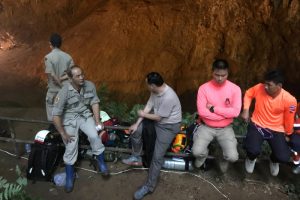
By Scott Malone
MANSFIELD, Mass. (Reuters) – The students at Al-Noor Academy, a Muslim school outside Boston, bombarded their government class speaker with questions: How do you start a political discussion? How do you use social media in politics? And how do you influence elected leaders?
The group of mostly 16-year-olds was too young to vote but seemed eager to find ways to counter the rhetoric of President Donald Trump who last week issued travel restrictions to the United States by citizens of seven Muslim-majority countries.
“Before this election happened, I really didn’t know much about politics at all,” said Sarah Sendian, a sophomore student at the school in Mansfield, Massachusetts. “With the new president and all of the things that are happening, it sparked a lot of interest in a lot of young people.”
The class is one of the first actions of newly formed Muslim political organization Jetpac – standing for Justice, Education, Technology, Policy Advocacy Center – to encourage political activism among the 3.3 million Muslims who make up about 1 percent of the U.S. population.
“This is the time when Muslims should step forward,” said Nadeem Mazen, the group’s founder and a city councilor in Cambridge, Massachusetts. “What’s going on at the national level only emphasizes what we’ve known prior to Trump being elected, and it’s that we need really good leaders.”
Thursday’s lesson at the 116-student junior and senior high school was heavy on how to build networks of like-minded people and turn them out at public meetings, rallies and elections to amplify the voices of U.S. Muslims.
About 824,000 of them were registered to vote as of 2016, a figure that had risen by about 60 percent over the past four years, according to national Muslim advocacy group the Council on American-Islamic Relations.
‘KNOW WHAT YOU’RE DOING’
The class’s teacher, Joe Florencio, reminded his students that generations of immigrant populations have gone through the same process of becoming politically active.
“To be effective politically, you have to know what you’re doing,” said Florencio, the sole non-Muslim faculty member in a building that once housed the Roman Catholic church where his parents were married.
Students at the school, founded in 2000, study both standard U.S. academic subjects including science and math as well as Arabic and the Koran, a model similar to the many parochial schools in the northeastern United States.
Jetpac, which hopes to eventually offer versions of the class to private and public schools across the United States, faces an uphill climb. The number of anti-Muslim attacks reported to the FBI last year spiked to their highest level since 2001, the year that al Qaeda-backed hijackers destroyed New York’s World Trade Center.
While the group acknowledged that it will take time for political newcomers to win elections, even the act of campaigning could help Muslims, simply by making people more familiar with politics, said Faiza Patel, of the NYU School of Law’s Brennan Center for Justice.
“It allows them to meet lots of people, people that they might not otherwise meet and that has the effect of reducing prejudice,” said Patel, who studies interactions between Muslims and the U.S. justice system. “You start to see people as human beings.”
Almost half of respondents to a 2016 Pew Research Center poll said they believed that at least some U.S. Muslims harbored anti-American views, but respondents who knew a Muslim personally were less likely to believe that than ones who did not.
Yousef Abouallaban, a member of the Al-Noor school committee whose two eldest sons have attended the school, said he hoped the class would help the children of Muslim immigrants overcome a bias held by some of their parents against getting involved with politics.
“We were raised in a different culture where our belief is that people who get involved in government are corrupt people. At all levels. So if you are a decent person, you should never get involved in politics,” said Abouallaban, who immigrated from Syria in 1989. “That’s not the case in the United States and this mentality has to be changed.”
(Reporting by Scott Malone; Editing by Bill Rigby)







